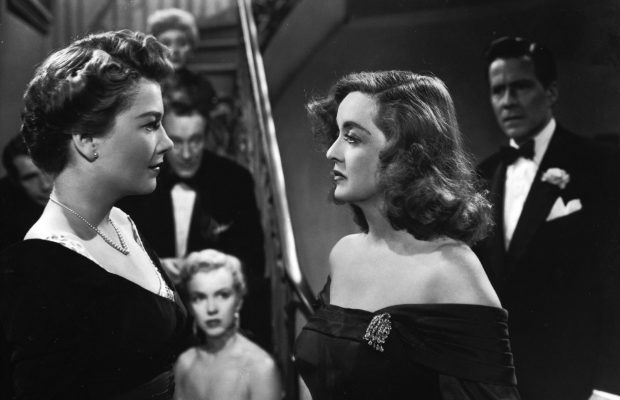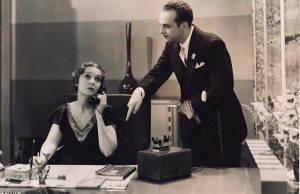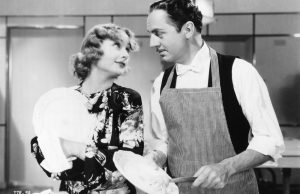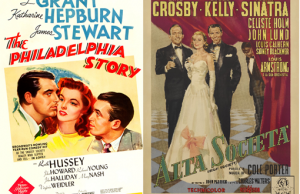All About Eve (1950)
By Toronto Film Society on June 28, 2016
Toronto Film Society presented All About Eve (1950) on Monday, February 4, 1980 in a double bill with A Letter to Three Wives as part of the Season 32 Monday Evening Film Buff Series, Programme 6.
Production Co: Twentieth CenturyFox. Producer: Darryl F. Zanuck. Director: Joseph L. Mankiewicz. Screenplay: Joseph L. Mankiewicz from the short story & radio play “The Wisdom of Eve” by Mary Orr originally published in Cosmopolitan. Photography: Milton Krasner. Editor: Barbara Bates. Art Directors: Lyle Wheeler & George W. Davis. Music: Alfred Newman, Assistant Director: Gaston Glass. Costume Design: Edith Head (for Bette Davis) & Charles Le Maire. Sound Recording: W.D. Flick & Roger Heman. Scenes filmed at the Curran Theatre, San Francisco.
Cast: Bette Davis (Margo Channing), Anne Baxter (Eve Harrington); George Sanders (Addison De Witt); Celeste Holm (Karen Richards); Gary Merrill (Bill Sampson); Hugh Marlowe (Lloyd Richards); Thelma Ritter (Birdie); Marilyn Monroe (Miss Caswell); Gregory Ratoff (Max Fabian); Barbara Bats (Phoebe); Walter Hampden (speaker at dinner); Randy Stuart (girl); Craig Hill (leading man); Leland Harris (doorman); Barbara White (autograph seeker); Eddie Fisher (stage manager); William Pullen (clerk); Claude Stroud (pianist); Eugene Borden (Frenchman); Helen Mowery (reporter); Steven Geray (captain of waiters); Bess Flowers (well-wisher).
The reputation of Joseph L. Mankiewicz, for those who remember him today, is largely a product of his work during the fifties. This program provides a whiff of the flowering of Mankiewicz with A Letter to Three Wives and All About Eve.
Mankiewicz came to direction after an apprenticeship of about 15 years of screen writing. Just as some director’s films are described as editor’s films or photographer’s films, so Mankiewicz’s films might, without gross injustice, be described as writers’ films. Mankiewicz seems to believe that if films are going to talk, it is desirable that they say interesting things. If these things are not always philosophically profound, then they can at least be witty. This should not, however, suggest that his films are devoid of visual interest or that they are so literary that they are devoid of cinematic interest.
Both A Letter to Three Wives and All About Eve exemplify characteristic concerns of Mankiewicz which have figured in most of his films. Perhaps the most readily discernible of these is found in his treatment of women. In most of Mankiewicz’s films the women are depicted as flawed; however, they are also both more memorable and somehow better than the men who have their own, though less interesting, flaws. Certainly the women in most of Mankiewicz’s films are more striking than the men. He has provided actresses such as Linda Darnell and Bette Davis with roles which are among the high points of their careers. “Woman” for Mankiewicz is a locus of dominating power yet, in most of his films, “woman” is ultimately subservient to “man”. This later aspect of the Mankiewiczian woman, which appears today to be a cop-out, is actually a reflection of Mankiewicz’s leanings toward romanticism which accompanied his often caustic wit.
In turn, this duality of woman gives form to Mankiewicz’s conception of marriage and its functional alternatives as a meeting place which is ultimately fragmented. Mankiewicz sees human relationships as a quest for permanence; no matter how manifestly transient. Beyond the wit and its suggestions of residual romanticism, Mankiewicz’s conception of relationships is that of an attempt to barter with the essential human predicament that we have not always existed, we will not always exist and, so long as we do exist, we are alone. This is most brilliantly exemplified in All About Eve in the famous stranded car scene during which Bette Davis’ facial and vocal display of emotion complements and extends this conception of relationships scripted by Mankiewicz. Though not embodied in such a signal scene, this is also the unifying sensibility of A Letter to Three Wives.
Another preoccupation of Mankiewicz is the various ways in which the past permeates the present. This is most obviously expressed in Mankiewicz’s use of flashbacks. While Mankiewicz made his films at a time when the use of flashbacks as a structural convenience was fashionable, Mankiewicz used the flashback as more than a structural convenience in telling a story. For Mankiewicz the flashback illuminates how the past has shaped the present. It plays an integral part in the presentation of the thematic preoccupations that are characteristic of Mankiewicz, and most commonly brings into conjunction a quest for permanence and fear of transience.
In his critique of directors in The American Cinema (1968), Andrew Sarris clumped Mankiewicz into a category given the name “Less than meets the eye.” On the other hand, writing in 1950, Jean Luc Godard expressed his opinion that even the films made before All About Eve sufficed “to establish Joseph Mankiewicz as one of the most brilliant of American directors” (Milne, p. 13). Eight years later, Godard cited A Letter to Three Wives and All About Eve, among other Mankiewicz films, both as seeming to prove that Mankiewicz did not make films for the average spectator and as films which “finally established their director as the most intelligent man in all contemporary cinema” (Milne, p. 82). The “average spectator” perhaps has changed over the last two decades. Both films tend to favourably impress those spectators who are fortunate enough to see them today, as they did large audiences when they were released three decades ago to win Mankiewicz Oscars for both his screenplays and his direction.
Trivia Notes
All About Eve
- While it was commonly thought that the incident upon which All About Eve was based had happened to Tallulah Bankhead, it actually happened to Elizabeth Bergner.
- About the Tallulah Bankhead confusion Bette Davis has said: “The problem was that I had no voice at all when I started filming All About Eve…A doctor gave me oil treatments three times a day for the first two weeks so that I could talk at all. This gave me the famous husky Bankhead voice. Otherwise, I don’t think the similarity to Bankhead in my performance would ever have been thought of.” (Stone, p. 252)
- Mankiewicz’s original choice for the role of Margo Channing was Marlene Dietrich who turned it down when Mankiewicz refused to insert a song for her. The role also was offered to Gertrude Lawrence who turned it down. Then the role was cast with Claudette Colbert who withdrew because of a back injury. The role was then offered to Ingrid Bergman who turned it down. The role which so perfectly suited Bette Davis was given to her because she was willing to start shooting in 10 days.
- The critic portrayed by George Sanders (for which he won the Academy Award for Best Supporting Actor) was modelled on Alexander Wolcott, many of whose phrases were used in the film.
- All About Eve was nominated for a record-breaking 14 Academy Awards. The dual nomination of Bette Davis and Anne Baxter for Best Actress is commonly thought ot have split the voting with the result that neither won.
- In an example of life imitating art, Bette Davis (Margo Channing) married Gary Merrill (Bill Sampson), July 28, 1950. Bette Davis has said that during the filming of All About Eve: “Bill Sampson was falling in love with Margo Channing!” The world premiere of All About Eve took place a little more than three months later, November 9, 1950.
- Don’t bother trying to recognize Eddie Fisher in the role of the stage manager. Although he remained in the credits his part was cut from the release version of the film.
References: The American Cinema, Andrew Sarris, 1968; The American Movies, Paul Michaes (Ed.), 1969; Bette Davis, Jerry Vermilye, 1973; Godard on Godard, Tom Milne, 1972; The Great Movie Stars, David Shipman, 1970; Mother Goddam, Whitney Stone with Bette Davis, 1974; Pictures Will Talk, Kenneth L. Geist, 1979; Screen World 1949, David Blum, 1950; Sixty Years of Hollywood, John Baxter, 1973.
Research by Helen Arthurs
Notes written by Marcia Gillespie and Lloyd Gordon Ward
You may also like...
-
News

Frances Blau
Toronto Film Society | February 27, 2024On Monday, February 26th, 2024, Toronto Film Society lost longtime friend, supporter, and board member Frances Blau. Known for her sense of humour, her love of film, her generosity,...
-
Special Events

Arsenic and Old Lace (1944) at the Paradise Theatre
Toronto Film Society | April 21, 2024Toronto Film Society presents Arsenic and Old Lace (1944) at the Paradise Theatre on Sunday, May 5, 2024 at 2:30 p.m. Screwball comedy meets the macabre in one of...
Programming

Virtual Saturday Night at the Movies
Toronto Film Society | April 11, 2024Toronto Film Society is back in the theatre! However, we’re still pleased to continue to bring you films straight to your home! Beginning Season 73 until now we have...
4-
 Toronto Film Society | April 21, 2024
Toronto Film Society | April 21, 2024
-
 Toronto Film Society | November 6, 2022
Toronto Film Society | November 6, 2022
-
 Toronto Film Society | August 1, 2023
Toronto Film Society | August 1, 2023
Donate to Toronto Film Society – We’re now a Registered Charity!
-
Copyright © 2017 Toronto Film Society.











Leave a Reply